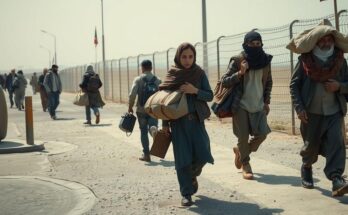Ukrainian and South Korean diplomats have initiated discussions about the repatriation of North Korean prisoners of war. South Korea’s Foreign Minister indicated the country’s readiness to accept these individuals as citizens, but the situation poses significant diplomatic challenges with both North Korea and Russia. As North Korean soldiers have played a critical role in the Ukraine conflict, the casualties among them raise urgent humanitarian concerns and highlight the stakes involved in these negotiations.
Recent discussions between Ukrainian and South Korean diplomats have focused on the future of North Korean prisoners of war captured in Ukraine. These conversations occurred on Monday, as reported by Yonhap News Agency. Efforts were made by Newsweek to obtain comments from both the Ukrainian Foreign Ministry and the South Korean embassy in the U.K.
The significance of these talks arises from the escalating conflict in Ukraine, where North Korean soldiers have reportedly become pivotal due to manpower shortages faced by Russia. South Korea, which has assisted Ukraine with humanitarian aid, finds itself in a precarious position regarding the potential repatriation of these North Korean prisoners, likely facing adverse reactions from both North Korea and Russia.
Seoul’s Foreign Minister, Cho Tae-yul, conveyed to his Ukrainian counterpart, Andrii Sybiha, that South Korea is willing to accept North Korean prisoners, recognizing them as citizens under South Korean law. He also indicated that should these soldiers express a desire to defect, South Korea would accommodate their requests.
Ukraine has detained two North Korean soldiers alive since January, following a brief period of medical care administered before their custody. Additionally, concerns arose regarding a wounded North Korean soldier who succumbed to his injuries shortly after capture. However, the National Intelligence Agency of South Korea reported that the captured soldiers did not seek asylum in South Korea.
The involvement of North Korean troops in the ongoing conflict has been notable, with estimates suggesting that approximately 12,000 soldiers from Pyongyang have been deployed to combat alongside Russian forces. The casualty rate among these troops has been significant, with reports indicating that one-third have either been injured or killed in combat.
South Korea’s Joint Chiefs of Staff have previously warned of North Korea’s intentions to bolster its military presence in Russia, especially following substantial troop losses. Reports suggest that the North Korean military has played a critical role in recent Russian advances in Ukraine.
During discussions, Minister Sybiha emphasized the heightened risks associated with the cooperation between Russia and North Korea. He expressed gratitude for South Korea’s support of Ukraine and acknowledged the threats this partnership posed to global security. Notably, Yeonmi Park, a North Korean defector, criticized Ukraine for allegedly linking the repatriation of North Korean prisoners to arms trade, arguing it contravened international humanitarian principles.
Ukrainian President Volodymyr Zelensky communicated the successful capture of North Korean soldiers, commending his military for their difficult task amid challenging circumstances presented by Russian forces. He asserted the importance of transparency regarding these prisoners, announcing plans for access to the media, thereby illustrating the realities surrounding the war’s involvement of North Korean troops.
Currently, North Korea has not issued any official response to South Korea’s proposals regarding the potential acceptance of the prisoners of war captured in Ukraine.
In conclusion, discussions between Ukraine and South Korea regarding the repatriation of North Korean prisoners of war underscore the complex geopolitical implications of the ongoing conflict. As South Korea navigates its approach to these prisoners while managing potential backlash from Pyongyang and Moscow, the situation remains precarious. The involvement of North Korean soldiers in the war has escalated tensions, highlighting the urgent need for careful diplomatic engagement moving forward.
Original Source: www.newsweek.com




